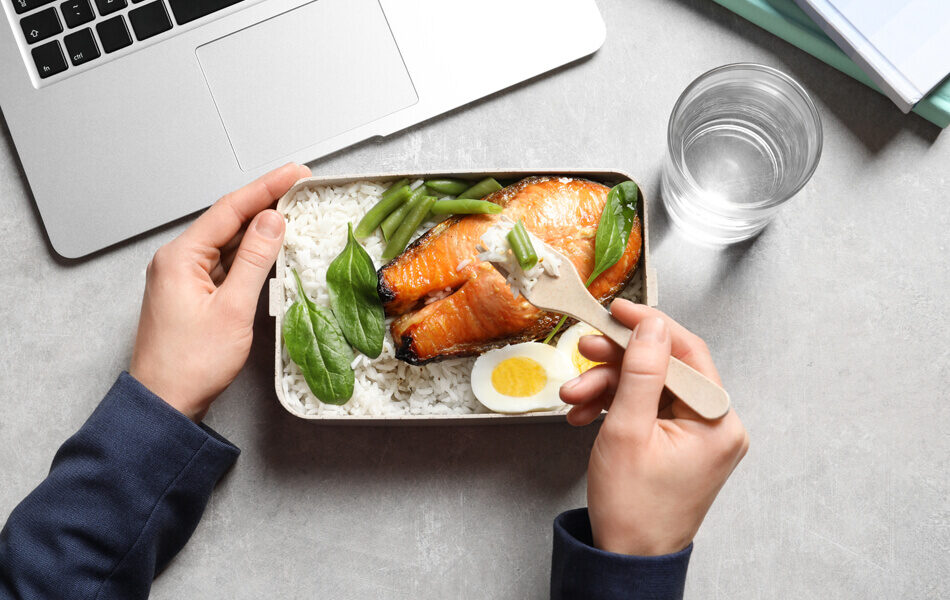What to Eat Before Fasting? The Answers You Need
Intermittent fasting results depends on lots of different factors. One of them is what you eat before starting your fasting window.

Getting ready to start a fast requires more than just deciding when your fasting period should be and how long it should last.
There’s a lot of thought and care that should go into what you eat before fasting. If you’re new to intermittent fasting, then you might be wondering: what should I eat?
Our experts are here to show you how to prepare for a fast, whether it’s a short one or a long one, and a list of the best foods to eat before fasting.
What to Eat Before Fasting
Some people think that right before a fast, they should just eat normally – and eat a lot. But that’s really not the best method. You don’t want to fast on an empty stomach, and it’s important to consume foods that are going to be gentle on your digestive system.
Here are the best foods to have for a pre-fast meal. They’re guaranteed to keep you feeling full during your fast, so you won’t struggle so much with feeling hungry.
#1 Chia seeds
Chia seeds are a great addition to your pre-fast meal or as a snack to help keep you feeling full.
#2 Fruits and vegetables
Fruit will help keep you hydrated, and your vegetables will provide you with a source of fiber that isn’t broken down by your gut bacteria.
#3 Eggs
Not only are eggs a great source of fat if you’re on a low-carb diet like the keto diet, but they’re also a great source of protein, which you’ll need for your fast.
#4 Fatty fish
Something like salmon or tuna is a great source of good fat. Healthy fat is one of the best things to eat so you can have an easy fast. If you don’t like fish, you can also eat shrimp or other seafood as it is a great source of protein.
#5 Lean protein
Unless you’re on a high-fat diet, your protein doesn’t need to have any extra fats on it. So consume a lean cut of protein to keep your muscle mass up.
How to Prepare for Fasting
Before you start a fast, it’s important to know just how to prepare. Even if you’re only fasting for a few hours, your body will thank you for having the right information on hand.
Short fast
To prepare for a short fast, it’s important that you know exactly how long you’re going to fast beforehand. When it comes to intermittent fasting, short fasts usually last a handful of hours: a 16-hour fast window with 8 hours of eating time in between.
Secondly, you should prepare for the changes that will occur in your body, even for such a short period of fasting. You’ll likely feel more fatigued as your body starts to learn how to distribute your energy levels throughout your fast period.
You also want to make sure that you’re getting enough protein before your fast. This helps make sure that you minimize any muscle loss that might happen. When you have a calorie deficit diet, your body loses muscle mass. You can combat this with enough protein.
Alter your diet in the week prior to your fast. Remove substances that might cause hunger cravings, like processed foods, refined sugar, and dense food with high carbohydrates. And, of course: stay hydrated! Drink lots of water before and during your fast.
Prolonged fast
A prolonged fast or a long fast are fasts in which you are not eating for 24 hours or more. When doing intermittent fasting, this eating cycle is often referred to as the “Eat Stop Eat” cycle, in which you fast for 24 hours once or twice a week.
When doing a longer fast, the human body will be sending hunger signals much more often. You want to be prepared to feel hungry and minimize this as much as possible.
Limit your diet 1–2 days before you begin your fast. You can’t just jump into a prolonged fast without preparing your body for what’s to come. So in a couple of days before your fast, make sure that you’re slowly reducing the amount of food you eat.
Get lots of rest! Your body will be using up your stores of energy while you’re fasting, so you want to make sure that your body has the energy to use. Take the day off of exercising on the day leading up to your fast.
Drink water. This may go without saying, but drinking water is going to be your best friend during your fast. Nothing is worse than feeling both hunger and a dry mouth.
What Foods to Avoid Before a Fast
Now that you know what you should eat, let’s look at what you definitely want to avoid. Certain foods are bound to raise your sugar levels, increase your cravings, and keep you feeling hungry for longer.
Here’s our list of foods that you should NOT eat for your last meal.
#1 Sugar
Don’t stuff yourself full of candy, cookies, baked goods, or other sweets. All this will do is upset your stomach and fill you full of carbohydrates. While it might taste great, your sugar cravings will be off the charts.
#2 Processed foods
A heavy meal right before your fast could actually cause a lot of issues when you try to digest it later. It’s best to stay away from processed foods with high sodium and zero nutrients.
#3 Soda
Much like sweets, soda is full of sugar and caffeine that won’t do you any favors while you’re trying to wait out your fast. Not to mention, it’s bad for your dental health.
A Word From Our Nutritionist
Intermittent fasting can be incredibly helpful for people who are trying to manage their weight. The benefits of both weight loss, as well as insulin levels, cell repair, and human growth hormone levels, are phenomenal.
Fasting can also reduce your risk of type 2 diabetes by reducing your insulin resistance and leveling out your blood sugar. But, you can’t just dive into a fast, especially if your body is used to eating three meals a day, every day.
One of the most important tips we can give people looking to start fasting is talking to their doctor. Your trusted healthcare professional knows your body and your body’s needs and can help you figure out if fasting is right for you.
Conclusion
Jumping into fasting isn’t as easy as one might think.
Preparing for a fast takes time and commitment, even if you’re planning on doing routine intermittent fasting. It’ll take a while for most people to get used to the changes in their bodies.
In order to stay healthy while fasting, the best foods to eat are fruits and veggies, healthy fat, and lots of lean protein. Avoid sugars, sodas, and processed foods.

















































 Select your language:
Select your language: 








